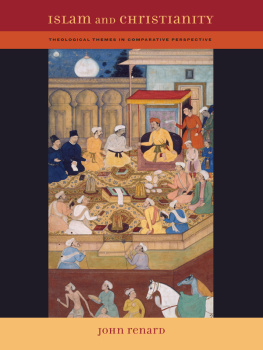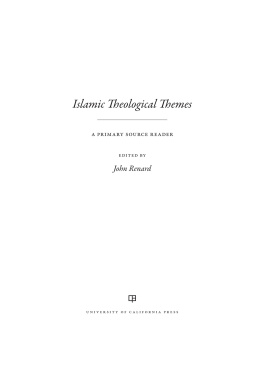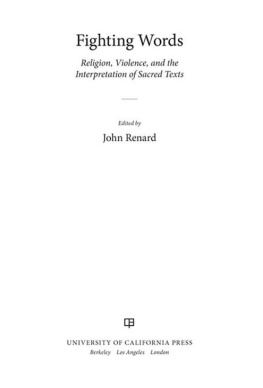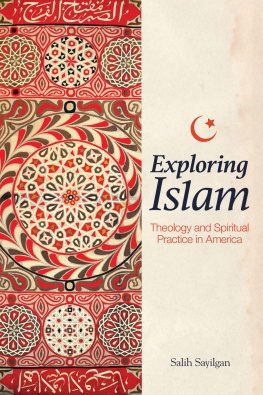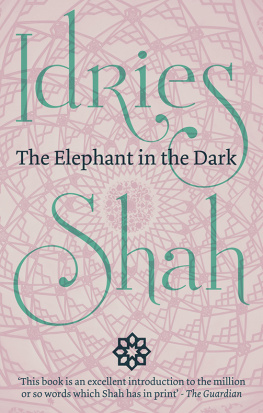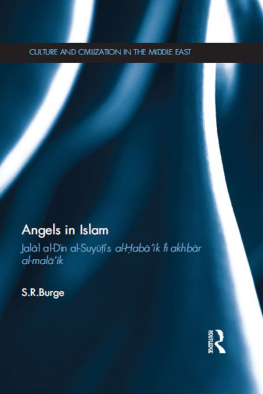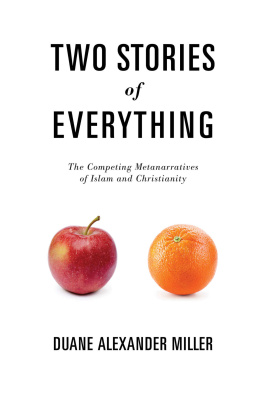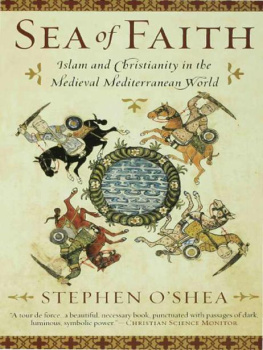Renard - Islam and Christianity: theological themes in comparative perspective
Here you can read online Renard - Islam and Christianity: theological themes in comparative perspective full text of the book (entire story) in english for free. Download pdf and epub, get meaning, cover and reviews about this ebook. City: Berkeley, year: 2011, publisher: University of California Press, genre: Religion. Description of the work, (preface) as well as reviews are available. Best literature library LitArk.com created for fans of good reading and offers a wide selection of genres:
Romance novel
Science fiction
Adventure
Detective
Science
History
Home and family
Prose
Art
Politics
Computer
Non-fiction
Religion
Business
Children
Humor
Choose a favorite category and find really read worthwhile books. Enjoy immersion in the world of imagination, feel the emotions of the characters or learn something new for yourself, make an fascinating discovery.
Islam and Christianity: theological themes in comparative perspective: summary, description and annotation
We offer to read an annotation, description, summary or preface (depends on what the author of the book "Islam and Christianity: theological themes in comparative perspective" wrote himself). If you haven't found the necessary information about the book — write in the comments, we will try to find it.
Renard: author's other books
Who wrote Islam and Christianity: theological themes in comparative perspective? Find out the surname, the name of the author of the book and a list of all author's works by series.
Islam and Christianity: theological themes in comparative perspective — read online for free the complete book (whole text) full work
Below is the text of the book, divided by pages. System saving the place of the last page read, allows you to conveniently read the book "Islam and Christianity: theological themes in comparative perspective" online for free, without having to search again every time where you left off. Put a bookmark, and you can go to the page where you finished reading at any time.
Font size:
Interval:
Bookmark:

Islam and Christianity
Theological Themes in Comparative Perspective
John Renard

UNIVERSITY OF CALIFORNIA PRESS
Berkeley  Los Angeles
Los Angeles  London
London
University of California Press, one of the most distinguished university presses in the United States, enriches lives around the world by advancing scholarship in the humanities, social sciences, and natural sciences. Its activities are supported by the UC Press Foundation and by philanthropic contributions from individuals and institutions. For more information, visit www.ucpress.edu.
University of California Press
Berkeley and Los Angeles, California
University of California Press, Ltd.
London, England
2011 by The Regents of the University of California
Library of Congress Cataloging-in-Publication Data
Renard, John, 1944.
Islam and Christianity : theological themes in
comparative perspective / John Renard.
p. cm.
Includes bibliographical references and index.
ISBN 978-0-520-25508-1 (cloth, alk. paper)
ISBN 978-0-520-26678-0 (pbk., alk. paper)
1. IslamRelationsChristianity. 2. Christianity
and other religionsIslam. 3. IslamDoctrines.
4. Theology, Doctrinal. I. Title.
BP172.R462 2011
297.2'83dc22 2010023443
Manufactured in the United States of America
19 18 17 16 15 14 13 12 11
10 9 8 7 6 5 4 3 2 1
This book is printed on Cascades Enviro 100, a 100% post consumer waste, recycled, de-inked fiber. FSC recycled certified and processed chlorine free. It is acid free, Ecologo certified, and manufactured by BioGas energy.
In grateful memory of
my parents
George (19112009) and Virginia (19152006)
and
Richard J. McCarthy, SJ (19131981),
who dedicated his professional life
to understanding and sharing the riches
of Islam's theological traditions
Recent world events have countless Americans and Europeans entertaining dire thoughts about the future of civilization. While many conjure up Islamic threats to a world in which the existence of secular societies is under siege, many more seem persuaded that Islam represents an ideology programmatically oriented to exterminating Christian civilization and its sociopolitical protg, the State of Israel. Scholars, journalists, think tanks, and pundits have produced a vast array of publications addressing various facets of this so-called clash of civilizations and the attendant threat analysis aimed at unmasking the sinister designs of the world's Muslims. Conspicuously rare amid the burgeoning catalogue of books on Islam and the West/Christianity are attempts to present straightforward comparisons between the explicitly theological themes that arguably form the core of the various subcommunities that have historically comprised Christendom and Islamdom.
It has long been commonplace to observe that Islamic tradition, like that of Judaism, pays more attention to orthopraxy than to orthodoxy. Such broad characterizations are of limited utility, however, and can give the mistaken impression that theology plays no significant role in the history of Islamic thought. Though it appears that concerns with creed and orthodoxy have occupied Christian thinkers more consistently than they have their Muslim counterparts, theological images, themes, questions, and problems have been very much in evidence throughout the history of Islamic religious thought from the very outset.
Small books about large topics invariably face a daunting array of limitations. Here are some of the most significant challenges that arise in a comparative study of theological themes in Christian and Islamic traditions. First, both traditions extend over vast expanses of time, space, and culture, and this volume represents a very selective overview. Even if one could credibly claim anything like consistency in theological developments in any centuries-old global tradition, selecting samples from the countless important figures and themes would be virtually impossible. Butand this is the second enormous hurdledespite intraconfessional claims to the contrary on both sides, the worldwide Christian and Muslim communities have both in fact been comprised of multiple subcommunities. Christians and Muslims alike might prefer to imagine that real Muslims or true Christians have never varied in the faiths they profess, but a striking diversity of views on virtually every significant theological question has been a major feature of both traditions. A relatively short survey such as this therefore confronts the thorny question of which of the many Christianities and Islams, all with their prominent spokespersons and great interpreters, to proffer as representative of the traditions. I do not attempt, furthermore, to describe contemporary Christianities or Islams, though I do seek to acknowledge in broad overview the vast sweep of historical developments down to our day. For reasons of space, simplicity, and the limitations of my own academic background, I lean toward characterizing source materials from classical or middle periods of history. In short, what I present here is in no way intended to characterize a normative version of either Islamic or Christian traditions, but to provide a selective overview of major theological themes in both.
That diversity in turn leads to a third challenge, namely, the choice of criteria for intertraditional comparability. Here it is crucial to observe an important difference between formal and functional comparisons. A fairly obvious formal comparison between Islamic and Christian traditions would be a pairing of foundational sacred texts, the Qur' n and the New Testament. Both are books and, from a phenomenological perspective, ought to be comparable to that extent. From a functional perspective, however, the two scriptures play very different roles in the two theological traditions. As the presence of the word of God in book form, or inlibration, the Qur'
n and the New Testament. Both are books and, from a phenomenological perspective, ought to be comparable to that extent. From a functional perspective, however, the two scriptures play very different roles in the two theological traditions. As the presence of the word of God in book form, or inlibration, the Qur' n functions more as a theological counterpart to the Christian understanding of Jesus as God's Word made flesh in the incarnation. The New Testament, as the words of Jesus, could then be paralleled with the Hadith, authoritative gatherings of the words and deeds of Muhammad. This in turn presupposes that one posits a similar function for Muhammad and Jesus, as foundational figures of the two traditions. Some would argue, to the contrary, that the apostle Paul functioned more credibly as a counterpart to Muhammad in institutionalizing the new faith communities as distinctive traditions. In the course of this volume, I will attend to such distinctions as needed.
n functions more as a theological counterpart to the Christian understanding of Jesus as God's Word made flesh in the incarnation. The New Testament, as the words of Jesus, could then be paralleled with the Hadith, authoritative gatherings of the words and deeds of Muhammad. This in turn presupposes that one posits a similar function for Muhammad and Jesus, as foundational figures of the two traditions. Some would argue, to the contrary, that the apostle Paul functioned more credibly as a counterpart to Muhammad in institutionalizing the new faith communities as distinctive traditions. In the course of this volume, I will attend to such distinctions as needed.
I want to underscore that such comparative accommodations are in no way meant to suggest that Muslims have thought of Christ as Logos or of the inj l as analogous to the sayings of Muhammad, or that Muslims typically draw such comparisons as these (though, in fact, some have). All comparisons and analogies, implicit or forthright, I suggest only as possible ways of making links between two very different families of religious traditions.
l as analogous to the sayings of Muhammad, or that Muslims typically draw such comparisons as these (though, in fact, some have). All comparisons and analogies, implicit or forthright, I suggest only as possible ways of making links between two very different families of religious traditions.
A fourth challenge is that in a book of this size that attempts to encompass a subject of such vast scope through a selection of diverse themes, it is all but impossible to root each theme adequately in its rich and complex historical contexts. As a result, the reader must understand in advance that the juxtaposition of structurally similar features in Christianity and Islamfor example, exegetical traditions, development of analogous institutions such as educational systems, or structures of intentional communitydoes not imply a simple one-to-one correspondence across traditions. Many differences, from the subtle to the mutually incompatible, remain to be acknowledged and discovered by further exploration into the themes laid out in these chapters. In short,
Font size:
Interval:
Bookmark:
Similar books «Islam and Christianity: theological themes in comparative perspective»
Look at similar books to Islam and Christianity: theological themes in comparative perspective. We have selected literature similar in name and meaning in the hope of providing readers with more options to find new, interesting, not yet read works.
Discussion, reviews of the book Islam and Christianity: theological themes in comparative perspective and just readers' own opinions. Leave your comments, write what you think about the work, its meaning or the main characters. Specify what exactly you liked and what you didn't like, and why you think so.

